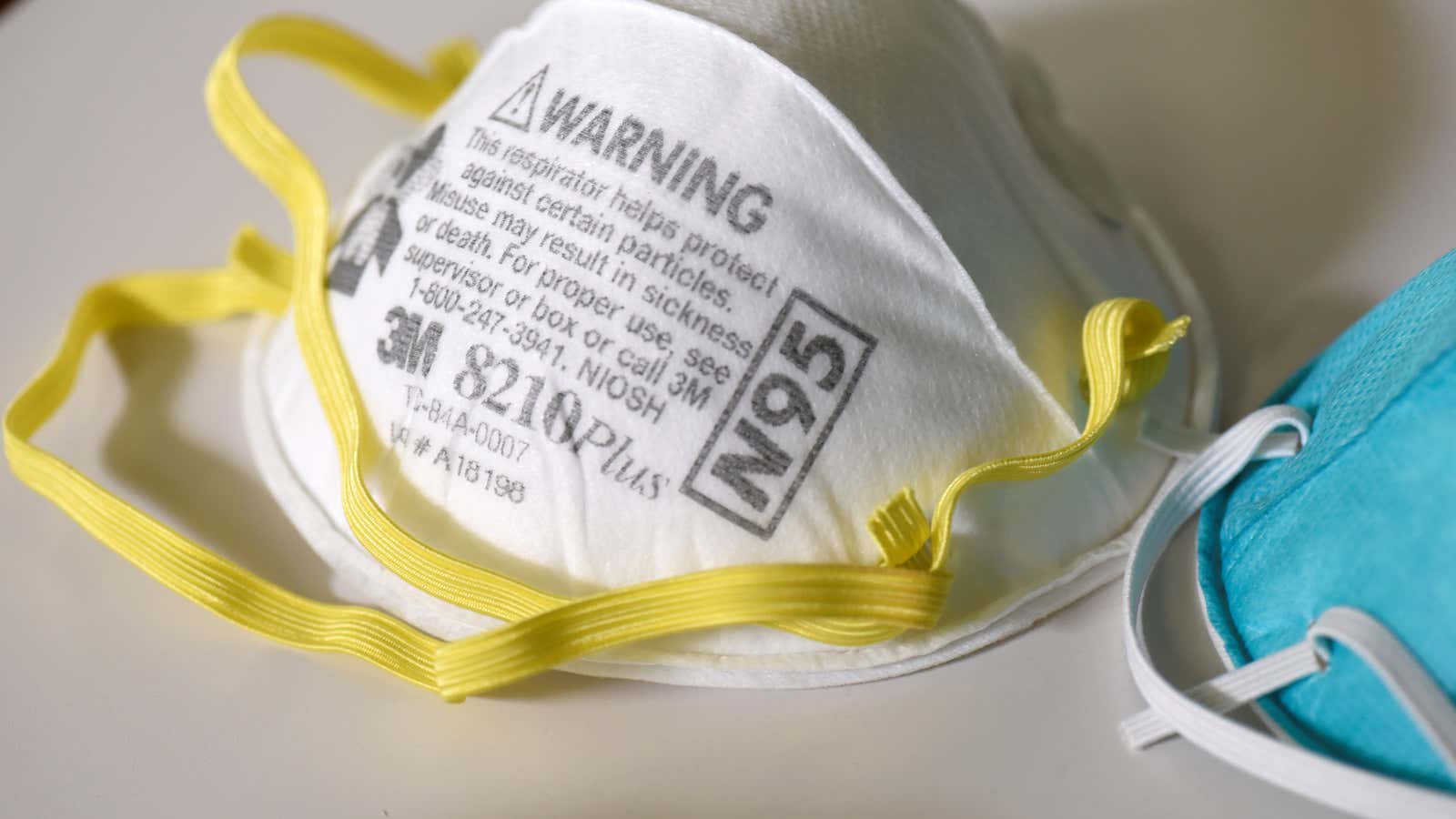Updated March 26: It’s been a week since we exposed widespread Coronavirus-related mask advertising on Facebook, and nearly three weeks since Facebook said it would start trying to stop itself from selling mask-related ads.
Facebook can’t stop itself. Quartz has seen numerous mask ads, even today.
It keeps selling the ads—and Facebook keeps booking the revenue—despite Facebook telling the public it doesn’t want the ads to be sold.
Facebook’s own tools, like dynamic product ads and a segment for people interested in masks, enable the supposedly-banned mask ads.
The ads have obvious red flags. One ad is from a page that’s three days old — the ads say they’re for a cycling mask, but contain a rendering of the coronavirus molecule, X-ed out in bright red.
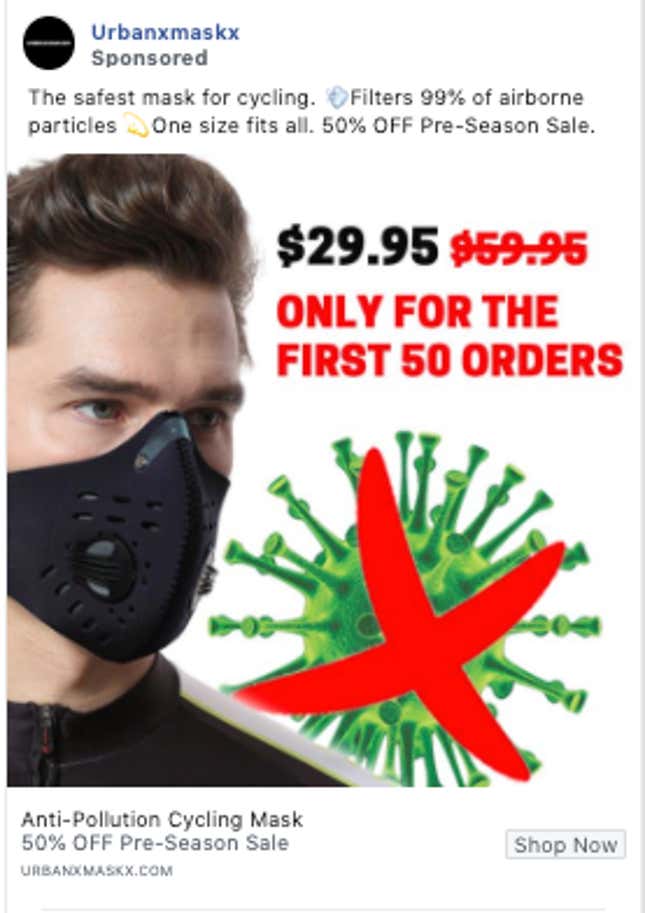
An Urbanxmaskx representative who didn’t give their name said the company offered “bulk pricing” for healthcare professionals, but wouldn’t say what their profit margins were.
Another ad was targeted to people “interested in Mask” — an audience segment created by Facebook. (The page was no longer in existence Thursday morning.)
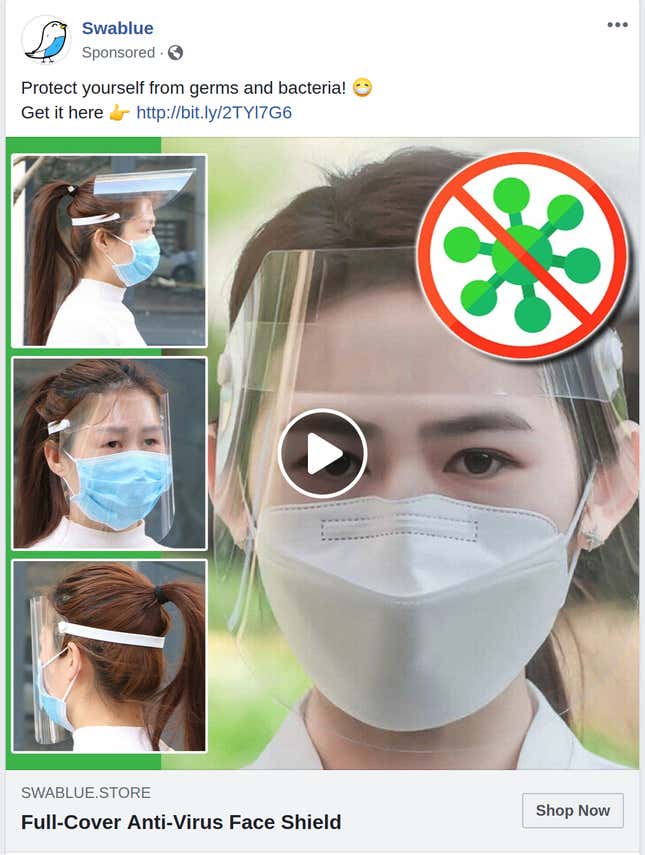
Another ad from online marketplace Tophatter contains the phrase “N95/Ffp2 Face Mask Respirator Masks.”
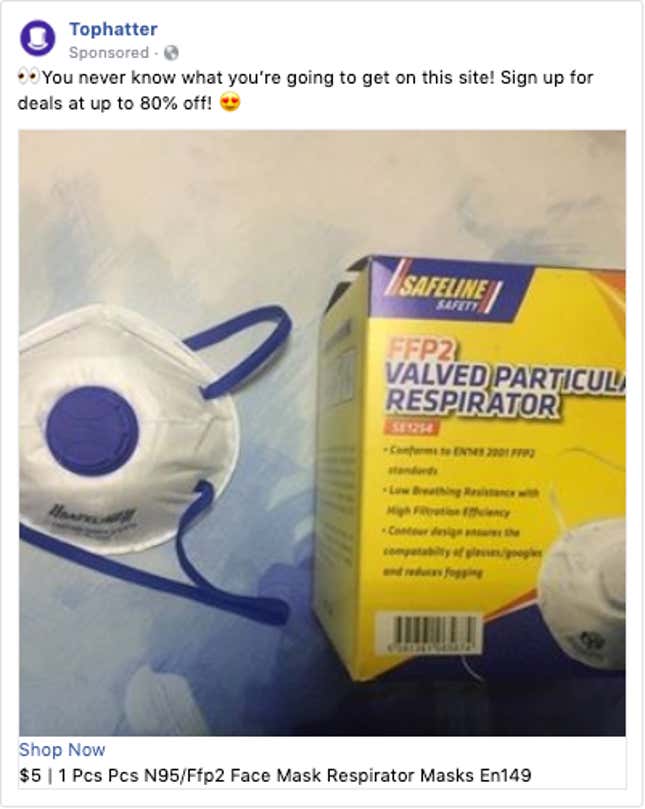
Tophatter said the ad used a Facebook feature where Facebook itself automatically chooses which product listings to display. After Quartz contacted the company, Tophatter stopped masks from showing up in its Facebook ads. It also said it monitors its platform against price gouging.
In a best-case scenario, masks advertised on Facebook are being diverted from healthcare workers, who need them desperately. At worst, they’re fakes—or, like an example reported by BuzzFeed News, ordered masks will never be delivered.
The Tech Transparency Project reported that some masks are being sold through Facebook’s own “shop” function.
To its credit, Facebook did donate its stockpile of 720,000 N95 masks, which it had stored for wildfires in California, to healthcare workers.
Facebook said it was looking into the mask category and the dynamic product ads. Facebook spokesperson Devon Kearns said that the company had “taken down millions of ads and listings” related to coronavirus (it has also banned, for instance, ads for hand sanitizer) but cautioned that its enforcement could never be perfect.
Original story:
Doctors in the US are warning of a shortage of N95 masks. But on Facebook and Instagram, apparent profiteers are hawking overpriced masks with ads that lead to web stores hosted on e-commerce platform Shopify.
That’s despite Facebook’s supposed ban on “medical face masks” as part of its response to the Covid-19 pandemic. And although Shopify says it has policies against price-gouging, the stores remain up.
Quartz found seventeen different stores advertising masks, just since Friday, March 13.
One Facebook advertiser, Happy Lungs, offers a 20 pack of 3M 8210 N95 respirator masks for $64.95. Walmart.com charges $13.24 for 20-packs, shipped from a third-party. (It’s currently out of stock.)
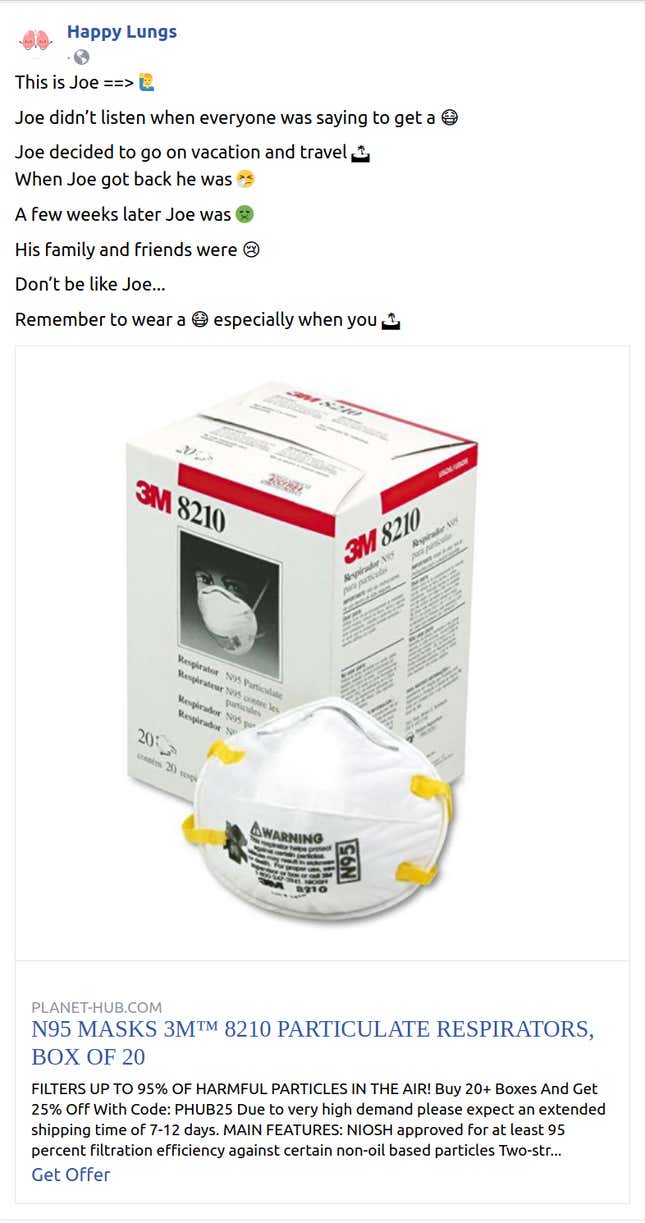
Happy Lungs didn’t respond to a request for comment sent via Facebook Messenger.
The Happy Lungs storefront, like those linked from the sixteen other ads found by Quartz, is hosted by Shopify, based in Ottawa, Canada. Amy Hufft, a Shopify spokesperson said, “Shopify considers price gouging to be a violation of Shopify’s Acceptable Use Policy and not aligned with our mission to make commerce better for everyone.” (On Wednesday, March 18, Shopify had taken down the shops that Quartz had alerted it to.)
“We have multiple teams who are always working to handle potential violations. We are closely following developments related to COVID-19 and price gouging behavior will not be tolerated,” Hufft added, saying that Shopify is reviewing the stores found by Quartz.
Amazon and other e-commerce platforms have banned price gouging—leaving some self-described “retail arbitrageurs” with huge supplies of gear, like hand sanitizer, and nowhere to sell it. Price gouging is also illegal in some jurisdictions, especially those that have declared states of emergency.
N95 masks are in short supply. Vice President Mike Pence asked construction companies, which also use the same masks, to donate their mask supplies to hospitals.
Masks aren’t generally recommended for healthy people. The US Centers for Disease Control and Prevention (CDC) writes “CDC does not recommend the routine use of respirators [its technical term for the masks]” in the community for healthy people, but “Patients with confirmed or suspected COVID-19 should wear a facemask until they are isolated in a hospital or at home.”
“If a healthcare professional hasn’t advised you to wear a face mask, it’s usually quite a bad idea,” said Dr. Jenny Harris, the UK’s deputy chief medical officer said. (Experts in Hong Kong disagree and do recommend masks for the general public.)
Enforcement Failure
On March 6, Facebook announced “We are temporarily banning advertisements and commerce listings, like those on Marketplace, that sell medical face masks. We’ll begin to enforce this change over the next few days.”
“Our teams are monitoring the COVID-19 situation closely and will make necessary updates to our policies if we see people trying to exploit this public health emergency,” the announcement went on to say.
It’s not entirely clear why Facebook is finding it hard to block the ads, submitted via its self-service platform. Some ads found by Quartz contain the phrases “Mask” and “Shop Now”—seemingly a sure sign that an ad would be worth a second look by Facebook’s enforcement teams.
Facebook didn’t provide answers to Quartz’s questions, but said it was looking into the ads Quartz found.
“These revelations taken together illustrate yet again what I’ve been saying about the dark underbelly of the entire behavior advertising-supported ecosystem for the last several years,” said US senator Mark Warner. “These platforms continue to be entirely too susceptible to abuse—whether that’s by far-right extremists, foreign intel services, or (as we see most often) fraudsters and other unscrupulous actors.”
Facebook doesn’t provide a way to search non-political ads by keywords. Its ad library only displays non-political ads if they’re currently running and if you know the exact Facebook page behind the ads. A crowdsourcing project run by several news organizations, including Quartz and the Globe and Mail in Toronto, is meant to provide a third-party check on Facebook advertising, primarily political ads, and allows us to search for these ads by keywords.
Help us track Facebook ads: Join the Facebook Political Ad Collector project and automatically contribute ads to our database as you browse Facebook. We’re using that data for accountability journalism.
It’s not just coronavirus-related ad rules that Facebook has had trouble enforcing. In the wake of Russia’s interference in the US election, which used Facebook ads to foment discord and amplify divisions in American society, Facebook implemented new rules to provide transparency for political ads. Those rules have often been flouted by shady corporate astroturf groups, by an unknown group called “America Progress Now” that’s the subject of a lawsuit against the Federal Election Commission, and by a Vice reporter who ran ads that falsely claimed to have been run by Mike Pence.
To its credit, Facebook has dedicated substantial resources to coronavirus response. It has announced plans to offer $100 million in grants to small businesses harmed by the near-shutdown of commerce around the world. It also has made grants to fact-checking organizations to combat misinformation. And it has offered free ads to the World Health Organization to spread health tips.
What would you get?
Tek G is a brand-new Facebook page that has been advertising N95 masks. The page was established on March 10 and its ad links to “lexxsupply.com.” That site’s listed contact email address is [email protected]. The Better Business Bureau has posted an alert about a “pattern of complaints” from consumers about LexuryNYC.com, “concerning non delivery of products.”
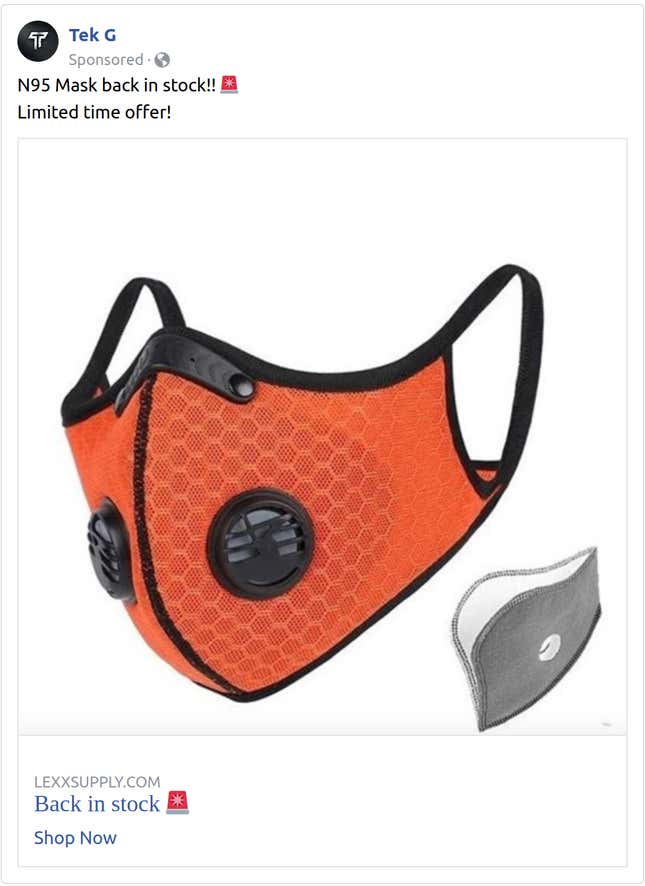
A Facebook page for Lexury NYC includes numerous complaints from people who say they ordered a product that never arrived.
Quartz requested comment in an email to the site’s listed contact address, but got no reply. The phone number listed on Lexury NYC’s Facebook page appeared disconnected. After Quartz reached out, the page linked to in the ads said “This shop is unavailable.”
Many shops say shipping will take weeks, with some specifying that items are shipped from China.
Happy Lungs’s website says masks would arrive in 7-12 days. The Facebook page was established March 12, so it’s unclear if anyone who ordered the products would expect to have received them.
Many of the ads on Facebook use identical images to masks sold on Wish, an e-commerce platform that features many goods sold and shipped directly from China. One such mask was sold on a Shopify store called Simple and Beyond for $29.95. On Wish, products featuring the same image cost $2.94 from one merchant and was free plus $4.00 shipping and handling from another merchant.
Simple and Beyond did not respond to a request for comment sent via its website’s contact form.
Who’s targeted
One of Tek G’s ads is targeted to people who Facebook thinks are interested in “Virus.” Other mask ads from other advertisers were shown just to those interested in “CNN” or “Barack Obama.” Some brands targeted their ads to people over age 35.
That’s according to targeting data collected by the crowdsourcing project, the Facebook Political Ad collector. Facebook has repeatedly refused to publicly disclose targeting information in its ad archive, sometimes citing advertiser’s competitive interests. Because Facebook does disclose that data to individual users, in the “Why am I seeing this?” menu item on each ad, the ad collector can add this information to our database.
Google, too, has announced “we are blocking all ads capitalizing on the coronavirus.” Google says “we’ve blocked tens of thousands of ads over the last six weeks.”
However, US Senators Mark Warren and Richard Blumenthal just urged the Federal Trade Commission to investigate Google, CNN reported, saying “Google has made repeated representations to consumers that its policies prohibit ads for products such as protective masks. Yet the company appears not to be taking even rudimentary steps to enforce that policy.” The senators go on to say that “These misrepresentations generate direct harm to consumers … ” and “create widespread social harms to our nation’s response to this crisis, such as by contributing to shortages of products essential to the health care workers on the front lines of the COVID-19 response.”
Google spokesperson Christa Muldoon said Google “continue[s] to take action to protect users and prevent these ads from serving.” Nevertheless, the ads continued to be easy to find—especially on stories about Google’s announcement of the ill-enforced ban.
Amazon said “We’re also working to ensure that no one artificially raises prices on basic need products during this pandemic and have blocked or removed tens of thousands of items, in line with our long-standing policy. We actively monitor our store and remove offers that violate our policy.” Amazon’s store has nevertheless been found selling misinformation about coronavirus.
Our findings suggest that even when violations of their policies could potentially have life-or-death ramifications, the platforms still struggle to control what happens on their websites.
